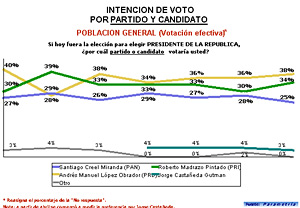 |
 |
 |
 Editorials | At Issue | June 2006 Editorials | At Issue | June 2006  
Deciphering the Worth of Mexican Polls
 Sean Mattson - San Antonio Express Sean Mattson - San Antonio Express


| | These days, no poll gives either Lopez Obrador or Calderon more than a 4-point lead making the race too close to call. |
Guadalajara, Mexico - When a poll doesn't show Andres Manuel Lopez Obrador in first place in the race for the Mexican presidency, the fiery leftist says it must have been cuchareada which means, roughly, a fantasy summoned by the dark forces that conspire against him.

Conspiracy theorists might be disappointed. Although Mexico has an indecorous history of crooked elections and, experts say, crooked polls, the nation's lurch toward democracy has cleaned up the elections and many pollsters appear to have followed suit.

Yet granting credibility to the cuchareada theory does not require a lot of imagination. Corruption is still rife in Mexico and some pollsters have political connections. Others won't reveal their poll methodology, which is key to judging their validity.

The political motivation for cooking the numbers is clear: A poll saying candidate "X" is in the lead helps reaffirm the support base, making sure his voters don't give up and stay at home on election day.

There are also the (sometimes wildly) conflicting results the pollsters produce.

Following a prime-time TV debate in early June, at least five major pollsters conducted who-would-you-vote-for-if-the-election-were-today surveys. Results contrasted considerably.

Lopez Obrador, of the Democratic Revolution Party, or PRD, scored anywhere from 34 to 37 percent. Felipe Calderon of the National Action Party, or PAN, had results spanning 8 percentage points, from 31 to 39.

Roberto Madrazo, of the Institutional Revolutionary Party, or PRI, also had results spanning 8 points. One pollster even put him within statistical striking distance of winning the election, but three others had him at least 12 points away from first place.

"Between one pollster and another, they have given very significant differences," said Fernando Castaρeda, the head of public opinion studies for the National Autonomous University of Mexico.

Experts said the conflicting results have more to do with the way pollsters weigh their results that is, adjust the numbers to accurately reflect the demographic variables, like age and gender, of Mexico's 71 million registered voters. Also, many pollsters try to only include the responses from "likely" voters, which they define differently.

"I've always felt that certain pollsters ... tend to measure certain parties better than others," said Jeffrey Weldon, a political scientist with the Autonomous Technological Institute of Mexico.

Despite these differences, pollsters in June have generally given similar margins to the leaders. And these days, no poll gives either Lopez Obrador or Calderon more than a 4-point lead making the race too close to call.

Lopez Obrador last week said his "internal" poll gives him a 10-point lead, but that might tell more about his familiarity with cuchareada polls than voter intentions. Who did the poll and what was its methodology? That's confidential.

mattson.sean@gmail.com | 
 | |
 |



